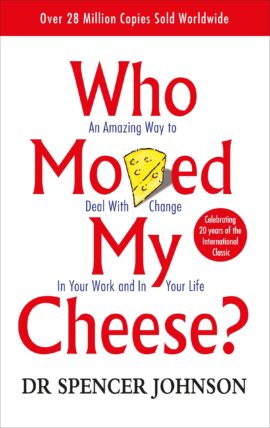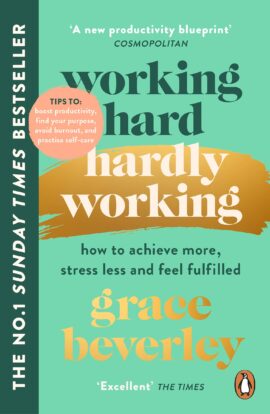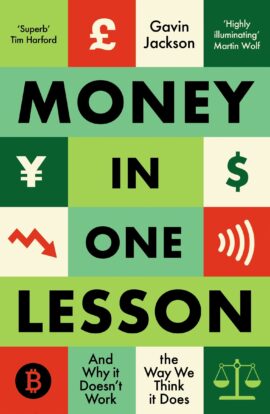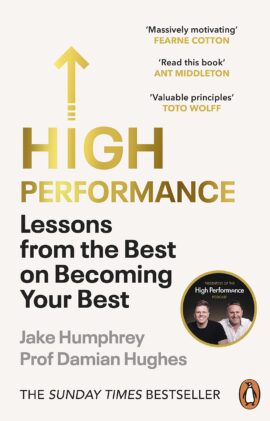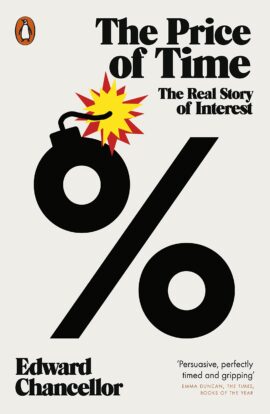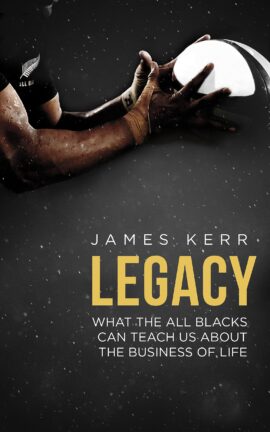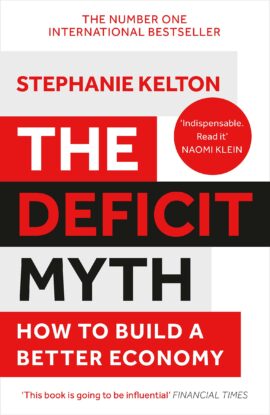«The Deficit Myth: Modern Monetary Theory and How to Build a Better Economy» a été ajouté à votre panier. Voir le panier
Comment dire non: Savoir refuser sans offenser
1.250,00 د.ج
9
Items sold in last 3 days
Félicitation ! vous bénéficiez d'une livraison gratuite !
0
People watching this product now!
Estimated delivery dates: septembre 16, 2025 – septembre 23, 2025
Informations complémentaires
| Editeur |
|---|
Produits similaires
Leading from Purpose: Clarity and the Confidence to Act When It Matters Most
2.070,00 د.ج
Cheese is a metaphor for what you want in life - be it a good job, a loving relationship, money or possessions, health or spiritual peace of mind. And the maze is where you look for what you want - the organization you work in, or the family or community where you live. This book shows how to anticipate change, adapt quickly, enjoy the change and be ready for more, so that you suffer from less stress and enjoy more success in life.
Working Hard, Hardly Working
2.530,00 د.ج
THE #1 SUNDAY TIMES BESTSELLER'Excellent.' The Times'Offers a fresh take on how to create your own balance, be more productive and feel fulfilled in the high-pressure social media age.' Cosmopolitan, 12 BEST NEW BOOKS TO READ'Serves some serious inspiration for the business-minded.' Bustle, TOP DEBUT BOOKS OF 2021'Pinpoints and unpacks the confusing and impossible messages we are all fed about modern work, how we are supposedly meant to be "nailing" all areas of our life all at once.' Emma Gannon________________We all know the pressure of feeling like we should be grinding 24/7 while simultaneously being told that we should 'just relax' and take care of ourselves, like we somehow have to decide between success and sanity. But in today's complex working world, where every hobby can be a hustle and social media is the lens through which we view ourselves and others, this seemingly impossible choice couldn't be further from our reality.In Working Hard, Hardly Working, entrepreneur and self-proclaimed 'lazy workaholic' Grace Beverley challenges this unrealistic and unnecessary split, and offers a fresh take on how to create your own balance, be more productive and feel fulfilled.________________A BOOK TO HELP YOU:Create your own Productivity Method: Work smart and do more of what you loveMake your routine work for you: Optimise your habits and reap the benefitsUnderstand your value: Get into your flow and enjoy your everydayEngage in effective self-care: How stepping back can help you move forwards
Money in One Lesson
2.530,00 د.ج
Superb' - Tim Harford, author of How to Make the World Add UpMoney is essential to the economy and how we live our lives, yet is inherently worthless. We can use it to build a home or send us to space, and it can lead to the rise and fall of empires. Few innovations have had such a huge impact on the development of humanity, but money is a shared fiction: a story we believe in so long as others act as if it is true.Money is rarely out of the headlines – from the invention of cryptocurrencies to the problem of high inflation, extraordinary interventions by central banks and the power the West has over the worldwide banking system. In Money in One Lesson, Gavin Jackson answers the most important questions on what money is and how it shapes our world, drawing on vivid examples from throughout history to demystify and show how societies and its citizens, both past and present, are always entwined with matters of money.‘A highly illuminating, well-researched and beautifully written book on one of humanity’s most important innovations’ – Martin Wolf, chief economics commentator, Financial Times
High Performance
2.530,00 د.ج
The phenomenal Sunday Times bestseller'Massively motivating' Fearne Cotton'A wealth of wisdom' Vex King'Read this book' Ant Middleton High performance isn't born. It's made. This book uncovers the eight essential habits of the world's leading sportspeople, coaches and entrepreneurs. From taking responsibility for your situation to finding your 'Trademark Behaviours', it reveals how the world's highest-achieving people unlocked their potential - and how you can too. Anyone can learn the secrets of high performance.'Full of valuable principles with real-world relevance to people's everyday lives' Toto Wolff'So many different lessons from so many remarkable people' Adam Peaty Drawing on conversations with... Dina Asher-Smith | Steven Bartlett | Tom Daley | Steven Gerrard | Evelyn Glennie | Ole Gunnar Solskjaer | Kelly Holmes | Chris Hoy | Eddie Jones | Siya Kolisi | Frank Lampard | Jo Malone | Matthew McConaughey | Ant Middleton | Tracey Neville | Robin Van Persie | Mauricio Pochettino | Gareth Southgate | Holly Tucker | Jonny Wilkinson | Clive Woodward | Toto Wolff and many more...
The Price of Time
1.950,00 د.ج
*Longlisted for the 2022 Financial Times Business Book of the Year Award*All economic and financial activities take place across time. Interest coordinates these activities. The story of capitalism is thus the story of interest: the price that individuals, companies and nations pay to borrow money.In The Price of Time, Edward Chancellor traces the history of interest from its origins in ancient Mesopotamia, through debates about usury in Restoration Britain and John Law ' s ill-fated Mississippi scheme, to the global credit booms of the twenty-first century. We generally assume that high interest rates are harmful, but Chancellor argues that, whenever money is too easy, financial markets become unstable. He takes the story to the present day, when interest rates have sunk lower than at any time in the five millennia since they were first recorded - including the extraordinary appearance of negative rates in Europe and Japan - and highlights how this has contributed to profound economic insecurity and financial fragility.Chancellor reveals how extremely low interest rates not only create asset price inflation but are also largely responsible for weak economic growth, rising inequality, zombie companies, elevated debt levels and the pensions crises that have afflicted the West in recent years - conditions under which economies cannot possibly thrive. At the same time, easy money in China has inflated an epic real estate bubble, accompanied by the greatest credit and investment boom in history. As the global financial system edges closer to yet another crisis, Chancellor shows that only by understanding interest can we hope to face the challenges ahead.
Working Hard, Hardly Working
2.530,00 د.ج
THE #1 SUNDAY TIMES BESTSELLER'Excellent.' The Times'Offers a fresh take on how to create your own balance, be more productive and feel fulfilled in the high-pressure social media age.' Cosmopolitan, 12 BEST NEW BOOKS TO READ'Serves some serious inspiration for the business-minded.' Bustle, TOP DEBUT BOOKS OF 2021'Pinpoints and unpacks the confusing and impossible messages we are all fed about modern work, how we are supposedly meant to be "nailing" all areas of our life all at once.' Emma Gannon________________We all know the pressure of feeling like we should be grinding 24/7 while simultaneously being told that we should 'just relax' and take care of ourselves, like we somehow have to decide between success and sanity. But in today's complex working world, where every hobby can be a hustle and social media is the lens through which we view ourselves and others, this seemingly impossible choice couldn't be further from our reality.In Working Hard, Hardly Working, entrepreneur and self-proclaimed 'lazy workaholic' Grace Beverley challenges this unrealistic and unnecessary split, and offers a fresh take on how to create your own balance, be more productive and feel fulfilled.________________A BOOK TO HELP YOU:Create your own Productivity Method: Work smart and do more of what you loveMake your routine work for you: Optimise your habits and reap the benefitsUnderstand your value: Get into your flow and enjoy your everydayEngage in effective self-care: How stepping back can help you move forwards
Legacy: What The All Blacks Can Teach Us About The Business Of Life
3.450,00 د.ج
THE 10TH ANNIVERSARY EDITIONChampions do extra.They sweep the sheds.They follow the spearhead.They keep a blue head.They are good ancestors.In Legacy, best-selling author James Kerr goes deep into the heart of the world's most successful sporting team, the legendary All Blacks of New Zealand, to reveal 15 powerful and practical lessons for leadership and business.Legacy is a unique, inspiring handbook for leaders in all fields, and asks: What are the secrets of success - sustained success? How do you achieve world-class standards, day after day, week after week, year after year? How do you handle pressure? How do you train to win at the highest level? What do you leave behind you after you're gone?What will be your legacy?
The Deficit Myth: Modern Monetary Theory and How to Build a Better Economy
2.990,00 د.ج
THE INTERNATIONAL BESTSELLER'Kelton has succeeded in instigating a round of heretical questioning, essential for a post-Covid-19 world, where the pantheon of economic gods will have to be reconfigured' Guardian'Stephanie Kelton is an indispensable source of moral clarity ... the truths that she teaches about money, debt, and deficits give us the tools we desperately need to build a safe future for all' Naomi Klein'Game-changing ... Read it!' Mariana Mazzucato'A rock star in her field' The Times'This book is going to be influential' Financial Times'Convincingly overturns conventional wisdom' New York TimesSupporting the economy, paying for healthcare, creating new jobs, preventing a climate apocalypse: how can we pay for it all? Leading economic thinker Stephanie Kelton, shows how misguided that question is, and how a radical new approach can maximise our potential as a society. Everything that we've been led to believe about deficits and the role of money and government spending is wrong. Rather than asking the self-defeating question of how to pay for the crucial improvements our society needs, Kelton guides us to ask: which deficits actually matter?


